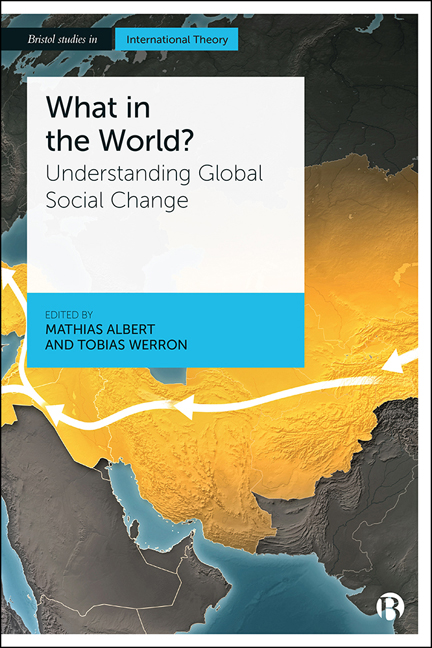Book contents
- Frontmatter
- Contents
- List of Figures and Tables
- Notes on Contributors
- Acknowledgements
- 1 Introduction: World Society and Its Histories – The Sociology and Global History of Global Social Change
- 2 Every Epoch, Time Frame or Date that Is Solid Melts into Air. Does It? The Entanglements of Global History and World Society
- 3 Periodization in Global History: The Productive Power of Comparing
- 4 Communication, Differentiation and the Evolution of World Society
- 5 Field Theory and Global Transformations in the Long Twentieth Century
- 6 Organization(s) of the World
- 7 Particularly Universal Encounters: Ethnographic Explorations into a Laboratory of World Society
- 8 From the First Sino-Roman War (That Never Happened) to Modern International-cum-Imperial Relations: Observing International Politics from an Evolution Theory Perspective
- 9 Nationalism as a Global Institution: A Historical-Sociological View
- 10 States and Markets: A Global Historical Sociology of Capitalist Governance
- 11 The Impact of Communications in Global History
- 12 The ‘Long Twentieth Century’ and the Making of World Trade Law
- 13 Third-Party Actors, Transparency and Global Military Affairs
- 14 Technical Internationalism and Global Social Change: A Critical Look at the Historiography of the United Nations
- References
- Index
3 - Periodization in Global History: The Productive Power of Comparing
Published online by Cambridge University Press: 22 December 2021
- Frontmatter
- Contents
- List of Figures and Tables
- Notes on Contributors
- Acknowledgements
- 1 Introduction: World Society and Its Histories – The Sociology and Global History of Global Social Change
- 2 Every Epoch, Time Frame or Date that Is Solid Melts into Air. Does It? The Entanglements of Global History and World Society
- 3 Periodization in Global History: The Productive Power of Comparing
- 4 Communication, Differentiation and the Evolution of World Society
- 5 Field Theory and Global Transformations in the Long Twentieth Century
- 6 Organization(s) of the World
- 7 Particularly Universal Encounters: Ethnographic Explorations into a Laboratory of World Society
- 8 From the First Sino-Roman War (That Never Happened) to Modern International-cum-Imperial Relations: Observing International Politics from an Evolution Theory Perspective
- 9 Nationalism as a Global Institution: A Historical-Sociological View
- 10 States and Markets: A Global Historical Sociology of Capitalist Governance
- 11 The Impact of Communications in Global History
- 12 The ‘Long Twentieth Century’ and the Making of World Trade Law
- 13 Third-Party Actors, Transparency and Global Military Affairs
- 14 Technical Internationalism and Global Social Change: A Critical Look at the Historiography of the United Nations
- References
- Index
Summary
Still, the problem of dealing with periodisation remains critical for anyone attempting to write contemporary world history. (Bayly, 2018: 324)
Introduction
Periodization in global history is difficult. Since nineteenth-century historicism and for far too long, European epoch concepts have been generalized without any further ado. Eurocentrism is merely a symptom of an even more fundamental challenge of periodization, however: it relies on comparisons. Comparing, this chapter argues, is a far from innocent activity. On the contrary, comparing has a productive power. The aim of this chapter is to show what scholars actually do when they cut history up into epochs, and why they should make the objective of their narrative explicit – at least if they want to escape Eurocentrism and other shortcomings in global history.
After modernization theory lost its power of persuasion in the 1970s and 1980s, historians developed a strong dislike for theories of historical change. This seems to apply particularly to those doing global history. Nonetheless, historians, and global historians in particular, do deliver interpretations of historical change. What is often quite revealing in this respect are book titles such as Remaking the Modern World (1900–2015) (Bayly, 2018), The Transformation of the World (Osterhammel, 2014), or The Origins of Globalisation (de Zwart and van Zanden, 2018). If a book's title refers to space instead of historical change, as in A History of Southeast Asia (Reid, 2015) or The World in the Long Twentieth Century (Dickinson, 2018), then it will be chapter headings that interpret specific time periods as periods of historical change, such as ‘Becoming a Tropical Plantation, 1780–1900’ (Reid, 2015: 196–212) or ‘Population Explosion, 1800–2000’ (Dickinson, 2018: 9–19). Historians cannot do without periodization. If they do not mention distinct periodizations – epochs or periods that are given distinct names, for example – they at least apply weak periodizations such as explanations for the periods of study or sequence of caesurae they have chosen. Since a sequence of periods with clear-cut boundaries between epochs has gone out of fashion, scholars of global history currently tend to work with overlapping time periods, sometimes even transforming them into thematically differing processes during a given period (Dickinson, 2018). Interestingly enough, the thematic order often becomes prominent in the final summarizing chapters (Bayly, 2018; de Zwart and van Zanden, 2018).
- Type
- Chapter
- Information
- What in the World?Understanding Global Social Change, pp. 43 - 62Publisher: Bristol University PressPrint publication year: 2020

